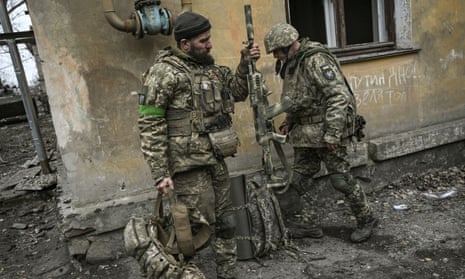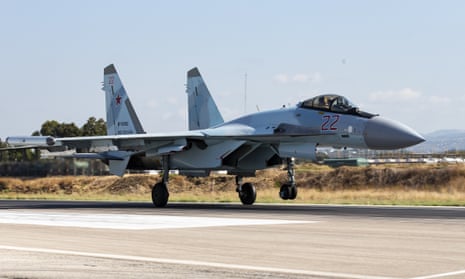Key events Show key events only Please turn on JavaScript to use this feature
Ukraine’s foreign minister also says Ukraine will keep defending Bakhmut.
“If we withdrew from Bakhmut, what would that change? Russia would take Bakhmut and then continue its offensive against Chasiv Yar, so every town behind Bakhmut could suffer the same fate.”
Asked how long Ukrainian forces could hold on, he declined to give a specific answer, comparing them to people defending their house against an intruder trying to kill them and take everything they own.
Some military experts have questioned the sense of continuing to hold the city, but the commander of Ukraine’s ground forces, Oleksandr Syrsky, said that it helped win time in preparation for the coming counteroffensive.
“The real heroes now are the defenders who are holding the eastern front on their shoulders, and inflicting the heaviest possible losses, sparing neither themselves nor the enemy,” Syrsky was quoted as saying in a statement on Saturday.
“It is necessary to buy time to build reserves and launch a counteroffensive, which is not far off.”
Ukraine’s foreign minister has urged Germany in an interview published on Sunday to speed up supplies of ammunition and to start training Ukrainian pilots on Western fighter jets.
Dmytro Kuleba told the Bild am Sonntag newspaper that ammunition shortages were the “number one” problem in Ukraine’s attempt to repel Russia’s invasion.
He said German weapons manufacturers had told him at the Munich Security Conference last month they were ready to deliver but were waiting for the government to sign contracts.
“So the problem lies with the government,” Kuleba was quoted as saying.
Kuleba made clear he did not expect Western allies to give Ukraine the fighter jets it has been asking for any time soon.
But he said Ukrainian pilots should be trained anyway, so they would be ready once that decision was taken, the paper wrote.
If Germany were to train Ukrainian pilots, that would be a “clear message of its political engagement”, he said.
Summary
Hello and welcome back to our live coverage of the Russia-Ukraine war. This is Christine Kearney bringing you up to date.
The Ukrainian military is preparing for an upcoming counteroffensive, with a top commander saying his forces’ ongoing defence of Bakhmut in the face of fierce and sustained Russian attacks is necessary to “buy time” for that push.
The remarks came as British intelligence said the frontline had shifted in the fight for Bakhmut – the longest and bloodiest battle of Moscow’s year-long invasion – but that any further Russian advance in the devastated town would be “highly challenging”.
Ukraine and Russia are both claiming that hundreds of each other’s troops were killed over the previous 24 hours in the fight for Bakhmut, with a small river that bisects the town marking the new front line. The exact number of casualties is difficult to independently verify, Reuters reports.
Serhiy Cherevatyi, a Ukrainian military spokesperson, said that 221 pro-Moscow troops were killed and more than 300 wounded in Bakhmut. Russia’s defence ministry said up to 210 Ukrainian soldiers were killed in the broader Donetsk part of the frontline.

British military intelligence said on Saturday that Russia’s Wagner mercenary group had taken control of most of the eastern part of Bakhmut – an advance that the group’s founder, Yevgeny Prigozhin, claimed on Wednesday.
“In the city centre, the Bakhmutka River now marks the front line,” the British defence ministry said in its daily intelligence bulletin.
Moscow says capturing Bakhmut would punch a hole in Ukrainian defences and be a step towards seizing all of the Donbas industrial region, a major target. Kyiv counters that the battle is grinding down Russia’s best units.
British intelligence said that with the river running through some open ground, “this area has become a killing zone, likely making it highly challenging for Wagner forces attempting to continue their frontal assault westward”.
In other developments as it turns 9am in the Ukrainian capital, Kyiv:
Three civilians were killed in Russian shelling of Kherson in southern Ukraine on Saturday, and another died in Donetsk, regional officials said. Reuters reported the governor of Kherson oblast, Oleksandr Prokudin, as saying three people, including an elderly woman, had also been wounded. President Volodymyr Zelenskiy said the three people killed in Kherson had gone to a store to buy groceries. “I would like to support all our cities and communities that are subjected to brutal terrorist attacks,” he said in a regular evening video address.
Russia has bombarded Ukraine more than 40,500 times since its invasion in February 2022, according to the Ukrainian interior minister, Ihor Klymenko. The shelling had destroyed more than 152,000 residential buildings since the war began, Euromaidan reported Klymenko as saying.
Russian missile strikes targeted “critical infrastructure” in Zaporizhzhia, the Kyiv Independent reported. The strikes launched on Saturday were likely to have come from S-300 air defence missiles, the outlet reported the Zaporizhzhia oblast military administration as saying.
Ukraine’s foreign minister, Dmytro Kuleba, dismissed reports that a “pro-Ukrainian group” carried out a high-profile attack on the Nord Stream pipelines late last year. Speaking to former Portuguese minister Bruno Macaes in an interview with the New Statesman, Kuleba said: “It is the first time that I’m hearing a story of a secret pro-Ukrainian or Ukrainian group that is able to conduct operations of that scale and sophistication.”
Canada has announced a ban on imports of Russian aluminium and steel products, with the aim of denying Moscow revenues to fund its war in Ukraine. The imports were worth almost C$250m (US$180m/£150m) in 2021, according to the latest government data.
Ukraine’s foreign minister urged Germany in an interview published on Sunday to speed up supplies of ammunition and to start training Ukrainian pilots on western fighter jets. Dmytro Kuleba told the Bild am Sonntag newspaper that ammunition shortages were the “number one” problem in Ukraine’s attempt to repel Russia’s invasion.
Most of Kyiv’s power supply was restored, Ukrainian officials said, after a Russian missile and drone barrage targeting critical infrastructure on Thursday. Power supplies were fully restored in Ukraine’s southern Odesa region, private provider DTEK said, while about 60% of households in Kharkiv city that were knocked off the grid were back online, Associated Press quoted authorities as saying. Significant damage remained in the Zhytomyr and Kharkiv regions in Ukraine’s north-west and north-east.
Iran has reached a deal to buy advanced Su-35 fighter planes from Russia, Iranian state media said on Saturday, expanding a relationship that has seen Iranian-built drones used in Russia’s war on Ukraine. “The Sukhoi-35 fighter planes are technically acceptable to Iran and Iran has finalised a contract for their purchase,” the broadcaster IRIB quoted Iran’s mission to the United Nations as saying in New York.

The UK government has written to Olympic sponsors urging them to pressure the International Olympic Committee over its proposal to allow Russians and Belarusians to compete at next year’s Paris Games, British media reported on Saturday. The IOC is facing a mounting backlash after setting out a pathway in January for competitors from Russia and its ally Belarus to earn Olympic slots through Asian qualifying and to compete as neutral athletes in Paris, Reuters reported.
Russia has listed the World Wildlife Fund as a foreign agent. According to the Russian justice ministry, the Washington DC-based conservation group, “under the guise of protecting nature and the environment … tried to influence the decisions of the executive and legislative authorities” and “hindered the implementation of industrial and infrastructure projects”, the Associated Press reports.

 1 year ago
54
1 year ago
54










 English (US)
English (US)